- Home
- Dandi Daley Mackall
Unhappy Appy
Unhappy Appy Read online
Visit Tyndale’s exciting Web site for kids at www.tyndale.com/kids and the Winnie the Horse Gentler Web site at www.winniethehorsegentler.com.
You can contact Dandi Daley Mackall through her Web site at
www.dandibooks.com.
TYNDALE is a registered trademark of Tyndale House Publishers, Inc.
The Tyndale Kids logo is a trademark of Tyndale House Publishers, Inc.
Unhappy Appy
Copyright © 2003 by Dandi Daley Mackall. All rights reserved.
Cover photograph copyright © 2003 by Bob Langrish. All rights reserved.
Interior horse chart given by permission, Arabian Horse Registry of America®. www.theregistry.org
Designed by Jacqueline L. Nuñez
Edited by Ramona Cramer Tucker
Scripture quotations are taken from the Holy Bible, New Living Translation, copyright © 1996 by Tyndale House Foundation. Used by permission of Tyndale House Publishers, Inc., Carol Stream, Illinois 60188. All rights reserved.
This novel is a work of fiction. Names, characters, places, and incidents either are the product of the author’s imagination or are used fictitiously. Any resemblance to actual events, locales, organizations, or persons, living or dead, is entirely coincidental and beyond the intent of either the author or publisher.
For manufacturing information regarding this product, please call 1-800-323-9400.
ISBN 978-0-8423-5546-9, mass paper
To my future
son-in-law, Dave,
who is my
daughter Jen’s
Catman
Table of Contents
Chapter 1
Chapter 2
Chapter 3
Chapter 4
Chapter 5
Chapter 6
Chapter 7
Chapter 8
Chapter 9
Chapter 10
Chapter 11
Chapter 12
Chapter 13
Chapter 14
Chapter 15
Chapter 16
Chapter 17
Horse Talk!
Horse-O-Pedia
Author Talk
“Towaco, no!” I jumped from the paddock fence and raced to the pasture.
The grumpy Appaloosa ignored me. Ears flat back, teeth bared, he wheeled on Nickers, my white Arabian.
All Nickers had done was rest her head on the Appy’s back. I’d seen them do it a dozen times. But this time Towaco wanted no part of it.
“Nickers, run!” I shouted, trying to get to them. I stumbled over a clump of slimy brown leaves.
My horse nickered, the friendliest sound in the world. She lifted her head to greet me.
“Nickers, look out!”
Towaco’s head shot forward like a snapping turtle’s.
I heard a crunch as the Appy’s teeth closed around Nickers’ horseflesh.
Nickers let out a squeal and skidded back.
I raced up to her. “Nickers, are you all right?” I ran my hand down her neck and chest until I felt the teeth marks. Towaco had caught skin high on Nickers’ chest. Two tiny patches of hair were missing, but there wasn’t any blood.
I hugged my horse, feeling the pain myself, as if Towaco had bitten me in the chest. “Don’t feel bad, girl,” I murmured, pressing my cheek against her neck, feeling the early winter fuzz. “I know. You were just being a buddy.”
I glared at Towaco. He stood a few yards off, head lowered, but not grazing.
A picture of Nickers and Towaco a couple of months earlier flashed into my head. Like it or not, I have a photographic memory. It would be great if I could choose the pictures my brain takes, but I can’t. This photo came in full-blown color, showing the same two horses, but with Nickers as the bad guy, ready to kick a frightened Towaco.
Back in August, Victoria Hawkins had brought me her Appaloosa, the first problem horse for my new business as Winnie the Horse Gentler. Dad had sold our ranch in Wyoming after Mom died. Then he moved my sister, Lizzy, and me around for two years until we ended up here, in the last house in Ashland, Ohio, on the very edge of town. At first, I hadn’t expected to stay in Ohio any longer than we’d lived in the I states—Illinois, Indiana, and Iowa.
But a lot had happened since then. I’d ended up with my own horse, the most beautiful white Arabian in the whole world. People around here were pretty amazed that a kid like me, who looks even younger than twelve because she’s so short, could tame a horse everybody called Wild Thing. So I got a reputation like my mom had in Wyoming for gentling horses instead of breaking them. Mom taught me how to pay attention to the little details of a horse—how he holds his tail, twitches his withers, blinks his eyes, communicates.
Victoria Hawkins, who answers to “Hawk” when she’s not with our other classmates, had talked her mother into letting me work with her Appaloosa. The gelding had picked up some bad habits at Spidells’ Stable-Mart, a fancy stable across town, and I knew all he needed was pasture time. But the minute I’d turned Towaco out with Nickers, Nickers had wheeled around and kicked.
Remembering, seeing that mind picture of Towaco on the receiving end of mean, kept me from getting too angry at him now. “Come here, Towaco!” I called. “Let’s all make up, huh?”
Towaco didn’t stir, didn’t even twitch an ear. The Appy had been acting weird for over a week, ready to fight one minute and the next minute acting like he was too tired to come in for dinner.
“Hey, Winnie!” Lizzy, her brown hair pulled up in a perfect ponytail, raced by on the other side of the fence. People say my sister and I look alike, but Lizzy, who’s a year younger than me, is two inches taller. She doesn’t have my freckles. And even though our hair’s the same color, hers never looks like she just stepped out of a tornado. Without even trying, Lizzy was already the most popular girl in her sixth-grade class.
Behind Lizzy ran a girl about her size, with a short, blonde ponytail. The kid wore jeans and a navy sweatshirt like my sister’s.
“This is Geri!” Lizzy shouted.
So that was Geri. Lately, every other word that came from my sister’s mouth—and that was a lot of words—was Geri. If they weren’t off somewhere together, they were talking on the phone.
Geri waved. “You’re Lizzy’s big sister?” she shouted.
I nodded.
Lizzy didn’t stop. “Geri thinks she heard a peeper! Frog!”
If Geri loved frogs like my sister loved lizards, small wonder they’d ended up best friends. Back in Wyoming, Lizzy had her own lizard farm. Kids from school took field trips just to see her collection.
Nickers rubbed her soft muzzle into my neck. I think Towaco had hurt her feelings more than anything. It was like she’d lost her best horse friend.
I blew gently into her nostrils. It was an old Indian trick my mom had taught me, a sign of friendship horses exchange among themselves. Nickers snorted back.
“I know just how you feel.” Something had been kicking up inside me, and I couldn’t explain it. I’ve always considered horses my best friends. People are too hard to figure out. But lately, I’d had a longing for a human best friend. Maybe it was because Lizzy was gone so much with Geri now, or because it seemed like everybody else in middle school fell into best friends.
Or maybe it was one more way of missing my mom, who had been my best friend right up to the day she died.
Whatever it was, I’d been thinking about it all week. Hawk was the closest thing I had to a best friend. When we weren’t in school, we had fun riding horses together. We’d even ridden in a circus once.
At school it was a different story. Middle- school kids aren’t that different from horses in the wild, splitting off into “herds” and jockeying for position in their groups. Hawk’s herd was th
e popular group, and I didn’t fit in. It had taken some time, but things had gotten better. At least Hawk wasn’t afraid to say hello to me at school. Most of the time, she acted like my friend.
But for the past week or two, Hawk had been neglecting Towaco and me. Every day she came up with a different excuse why she couldn’t ride with me.
Now, finally, Hawk had agreed to a Saturday ride. I might have known today would be the day her horse would act up.
“Towaco?” I tried calling him again, but he acted deaf.
I headed toward the barn for oats to coax the Appy in. Nickers trailed after me, nudging my back to speed me up. A late-fall wetness hung in the morning air under a gray sky that made it feel like dusk.
When we stepped into the paddock, a handful of sparrows shot out of the barn. I squinted to see inside. “Hawk?”
Something rustled in the doorway, and out came four cats. One was my barn cat, Nelson, the sweetest little black kitty, with one white paw he manages to keep clean, even on muddy days. I recognized the two orange tabby cats as Moggie and Wilhemina, part of Catman’s brood.
“Hey, Catman!” I called, picking up Nelson and setting him on Nickers’ back. My kitty curled up and purred, rocking as Nickers walked smoothly into the barn.
Catman Coolidge nodded as Nickers passed him. “Far out, man.” Catman should have been born in the 60s, when he wouldn’t have been the only hippie in town. I’d gotten used to his striped bell-bottoms, tie-dyed shirts, long, wavy blond hair, and leather thong sandals, which he wore even on chilly days like this one.
“Like, coming or going?” Catman asked. Half a dozen more cats crept in from the pasture, the yard, the south field, all intent on getting Catman’s attention. Lizzy calls him the Pied Piper of Cats.
“Hawk’s supposed to come over and ride with me,” I said, following Nickers into the barn.
“Groovy.” Catman knew Hawk had been acting weird toward me. He has a quiet way of making me tell him things I never planned to tell anybody.
It took a minute for my eyes to adjust to the dark barn. I love our barn. Actually it’s owned by Pat Haven, my substitute science teacher and my boss at Pat’s Pets. The gray barn slats let in just enough light to send streaks of hay dust dancing through the row of stalls. And the whole barn smells like horse and hay and home.
I turned to see if Towaco had followed us, but he hadn’t. “Maybe not so groovy—not if I can’t get Towaco to come around. That Appy has been acting as strange as Hawk, Catman. He bit Nickers.”
“Downer.” Catman stretched his long neck to gaze out at the Appaloosa. “Dude looks sad, man. Unhappy Appy.”
It was exactly what I’d been thinking, that the only thing wrong with Towaco was that he was sad. I think he missed Hawk. Even when Hawk did stop by to see her horse, she was sharp and impatient with him. “Maybe a great ride through the fields with Nickers and me will fix Towaco and Hawk.”
I fetched a plastic bucket and dipped some oats into it. Nickers nickered at me, expecting at least a handful. I gave her two.
“Catman, I thought you and Barker would be at Pat’s Pets all morning.”
Eddy Barker is my age and just about the nicest person I know. He and Catman are best friends. Barker loves dogs the way I love horses and Catman loves cats. The three of us make up the Pet Help Line staff at Pat’s Pets, answering e-mails people send in about their problem pets.
Catman let Nelson curl around his neck. The tip of Nelson’s black tail swayed in front of Catman’s nose. “Barker’s in Texas. The annual Barker Thanksgiving reunion.”
“Lucky Barker.” I didn’t just mean because he’d be missing a couple days of school. Barker has the greatest family, and I was trying to imagine what a reunion full of Barkers would be like. Mr. and Mrs. Barker teach African-American studies, computer science, poetry, and classy stuff at Ashland University. “What are they doing with the dogs?” Barker had trained a dog for each of his five brothers.
“Traveling with,” Catman answered. “Can you dig it?”
I tried to imagine the Barker bus en route with five dogs, six kids, two parents, and one grandmother.
“I better saddle Towaco before Hawk gets here, Catman. I don’t want to give her an excuse to back out.” Tossing him a leadrope, I added, “Follow me, and keep that rope behind your back.”
I carried the bucket of oats to the pasture. Towaco was standing in the same spot, his head low, ears lopped to the sides. He’s a perfect, blanket-patterned Appy, dark brown with a solid white blanket over his rump and hips, brown spots scattered over the blanket.
“Mmmm. Look what I’ve got, Towaco. Oats!” I shook the bucket and let the grain swish against the sides.
The Appy’s ears flicked, but he didn’t come.
“Bummer,” Catman muttered from a few feet away.
Nickers came trotting up behind me.
“You don’t want Nickers to get it all, do you?” I asked, walking up to the Appaloosa.
Nickers nuzzled over my shoulder, around my arm, trying to stick her nose into the bucket.
Towaco let me walk up to him but didn’t even glance at the bucket. Something was really wrong. Horses are curious, especially about food. I held a handful of oats a foot from his nose, but he wouldn’t take a step toward me. Finally I gave up and moved the oats under his lips. He took my handful of grain, but didn’t ask for more.
Nickers stuck her head under my arm and into the bucket, greedily lipping up the grain. Towaco didn’t blink. He let out a horse sigh and dropped his head even lower.
“Carrots!” I cried, remembering how much the Appaloosa loved the carrots Hawk used to bring him. I shoved the bucket at Catman. “See if you can do anything with Towaco. I’ll be right back.”
I ran through the pasture toward the house, calling back to Catman, “If Hawk comes, do whatever it takes! But don’t let her leave!”
I treaded carefully through our yard, jumping over lawn-mower parts, broken vacuum cleaners, dissected toasters, and other small appliances—my dad’s “works-in-progress.”
People call Dad “Odd Job Willis.” He can fix anything they bring him, unless he gets distracted by his inventions. Dad thinks of himself as Inventor Willis, which is a long ways from what he was in Wyoming—Mr. Jack Willis, boss of an insurance company.
I leaped over a wad of coiled wires to our front step and nearly landed on a long, skinny, black shoe. It wasn’t like any shoe I’d ever seen. A rectangular bump on the tip of the toe looked like a switch. I picked up the shoe and flipped the switch. Out came a miniature garden shovel. When I did the same thing to the other shoe, a tiny spade popped out.
Carrying the shoes inside with me, I called out, “Hey, Dad! What’s with the shoes?” I figured they must be one of his latest inventions. And I hoped he didn’t expect me to wear them.
I crossed the living room to the kitchen. “Dad, I—!”
Dad was on his knees, wrestling with a large, black umbrella. But he wasn’t alone. She was with him. Madeline. Madeline Edison, fellow inventor. Dad met her at the Invention Convention in Chicago and discovered she lived in Loudonville, only a few miles from us. Lucky us.
I couldn’t take my eyes off them. What could my father be thinking, bringing a strange woman into our very own kitchen! I felt my ears go back, like Towaco’s. If they’d been horses, I’d have bitten them!
Neither Dad nor the woman turned from the black umbrella on the kitchen floor. It struck me that redheaded Madeline Edison was kind of umbrella-shaped herself, if the umbrella’s red and closed. She’s tall, thin, and pointy. She wore shiny black slacks and a red sweater and seemed totally fascinated with Dad’s umbrella.
I cleared my throat and opened the fridge.
“Winnie?” Dad asked, sounding surprised to find me in the kitchen.
“Carrots,” I mumbled, my head deep in the fridge.
“You remember Ms. Edison, don’t you?” he asked.
Like I could forget her. I’d met her right after
Dad got back from the Invention Convention. I suspected Dad had seen her a couple of times since then. I’d answered the phone once when she called. But this was the first time, as far as I knew, that she’d actually set foot in our house.
Foot! I realized I was still holding the shoes, which, judging by Madeline’s stocking feet, must have been hers.
Note to self: Let sleeping shoes lie.
Maybe I could sneak the shoes back outside before they noticed. . . .
“Hello, Winnie,” Madeline said. “Like my shoes?”
Before I could answer that I hated her shoes, had no idea how they’d gotten into my hands, she was by my side, staring down at me from her great height. “They’re my garden shoes,” she explained. “If I don’t feel like bending over, I wear these and let my feet do the digging.”
I handed them to her and tried not to look like I was about to hurl. “That’s nice, Ms. Edison.”
“Call me Madeline, Winnie.” Her voice was high-pitched, full of ups and downs, like a TV jingle. “I made Mason, my son, a pair of shoes just like these. He loves walking in the garden.”
I nodded, but my brain wheels were churning. She had a son. No wedding ring. Three minus one equaled divorce. My dad was friends with a divorced woman?
“Mason’s in school today,” Dad informed me, as if I cared. Besides, what kind of kid goes to school on Saturday?
Madeline absently slipped her shoes on her hands and glanced from Dad to me. She reminded me of a nervous American Saddle Horse. “Mason’s not in school school exactly. Special school . . . at the university.”
I remembered there was a genius kid in Catman’s class who took English or something at the university.
Madeline kept chattering. “I just hope he likes it there. He has trouble making friends. But he loves to learn. Most boys his age can be pretty rough.”
Great. All we needed in town is another brainier-than-thou boy.
I pocketed the bag of carrots and tried to make my getaway. Maybe Dad hadn’t known she’d drop by. But I hadn’t seen a car outside, just Dad’s cattle truck. What if Dad had driven to Loudonville and brought her here on purpose—to our house, without even asking Lizzy and me?

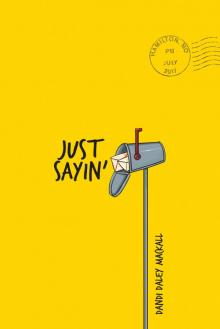 Just Sayin'
Just Sayin'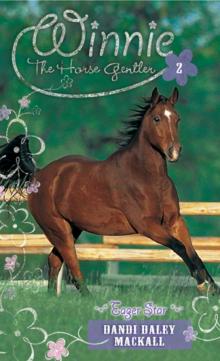 Eager Star
Eager Star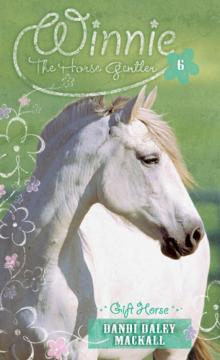 Gift Horse
Gift Horse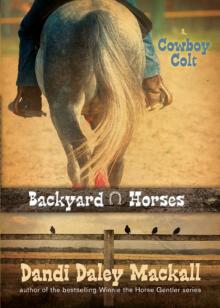 Cowboy Colt
Cowboy Colt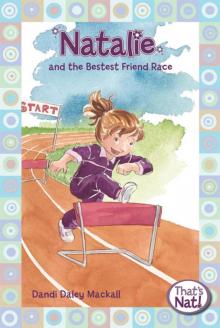 Natalie and the Bestest Friend Race
Natalie and the Bestest Friend Race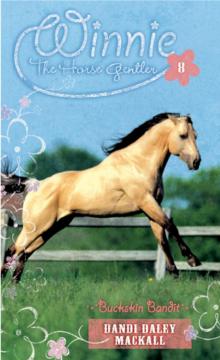 Buckskin Bandit
Buckskin Bandit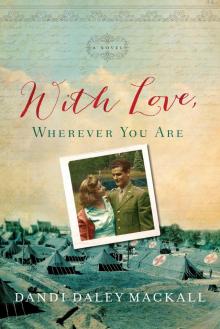 With Love, Wherever You Are
With Love, Wherever You Are Runaway
Runaway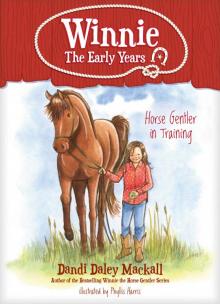 Horse Gentler in Training
Horse Gentler in Training Crazy in Love
Crazy in Love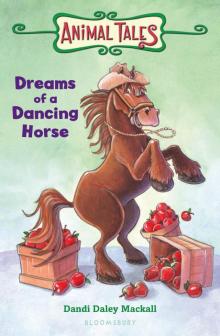 Dreams of a Dancing Horse
Dreams of a Dancing Horse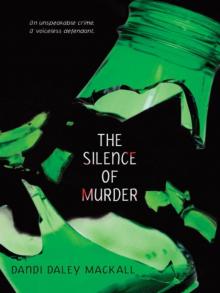 The Silence of Murder
The Silence of Murder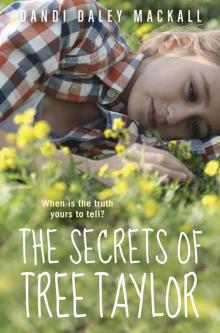 The Secrets of Tree Taylor
The Secrets of Tree Taylor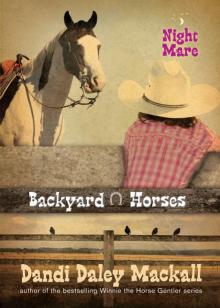 Night Mare
Night Mare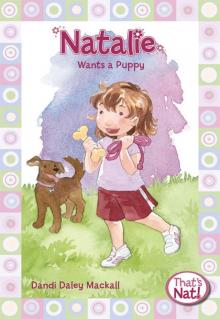 Natalie Wants a Puppy
Natalie Wants a Puppy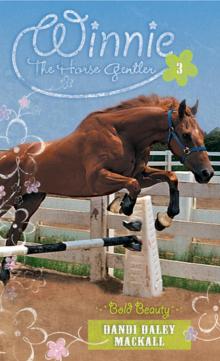 Bold Beauty
Bold Beauty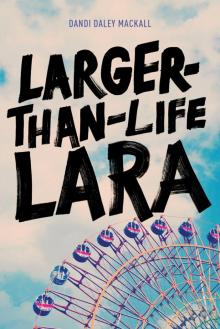 Larger-Than-Life Lara
Larger-Than-Life Lara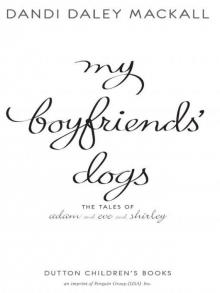 My Boyfriends' Dogs
My Boyfriends' Dogs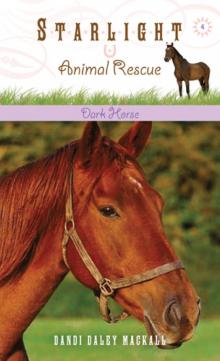 Dark Horse
Dark Horse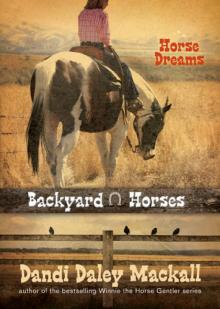 Horse Dreams
Horse Dreams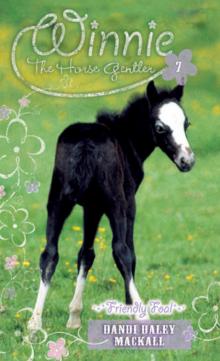 Friendly Foal
Friendly Foal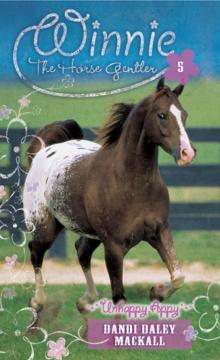 Unhappy Appy
Unhappy Appy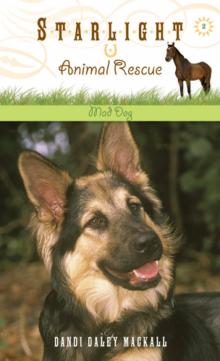 Mad Dog
Mad Dog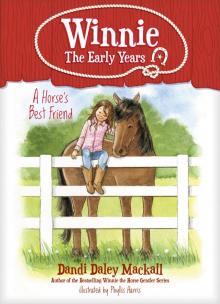 A Horse's Best Friend
A Horse's Best Friend